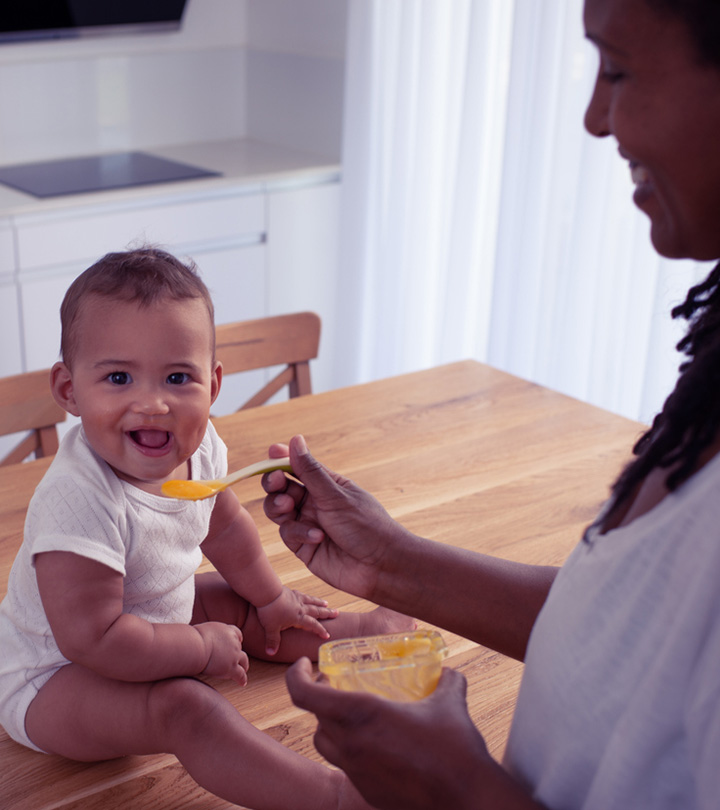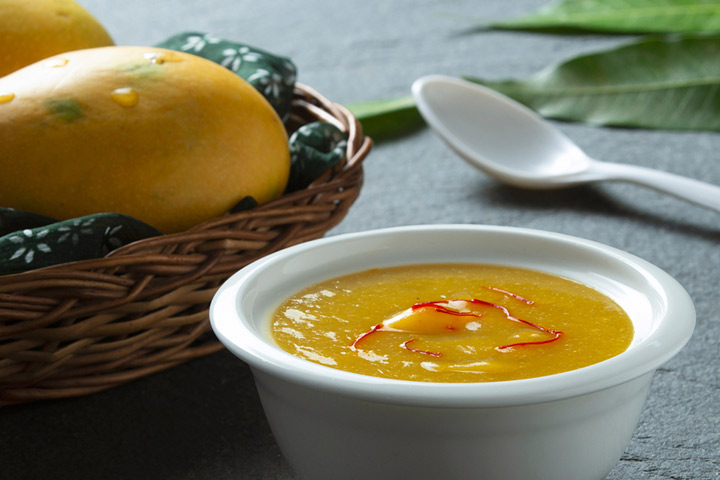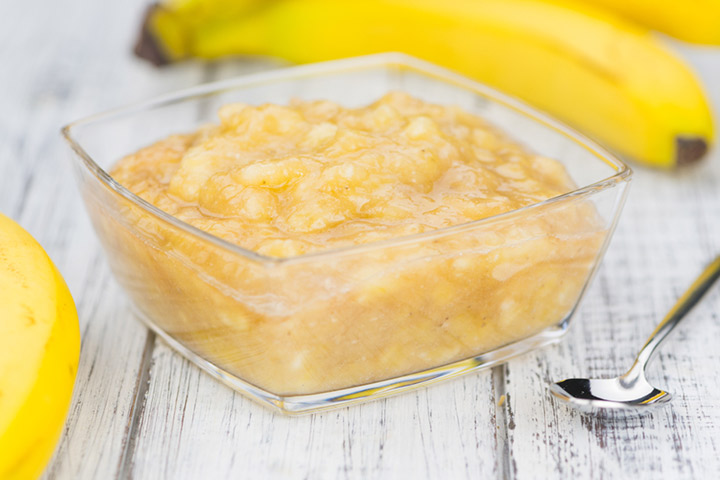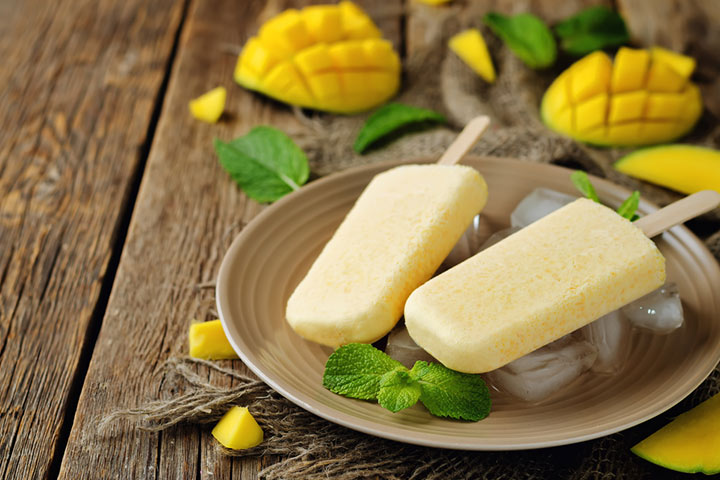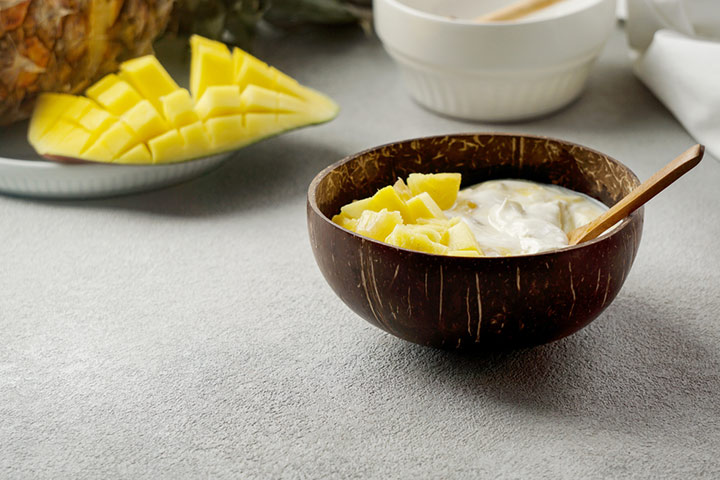Mango is a juicy tropical fruit rich in nutrients. Ripe mangoes taste sweet and have a soft pulp with a sweet aroma. Mangoes are also hypoallergeniciXCharacteristic of a substance to cause fewer allergic reactionsand relatively easy to digest, making mango for babies a good choice. But while mango seems to confer several benefits, you need to know the right age and appropriate ways to feed it to babies.
Keep reading as we give you an insight into the possible health benefits of mango for babies with the right age and age-appropriate ways to feed it.
When Can Babies Eat Mango?
Most healthy babies can eat ripe mango from around six months when they start eating solids (1). Initially, you can feed small amounts of smooth, lump-free mango puree or mash to meet your baby’s nutrition requirements. Once the baby develops the taste and digestibility of the fruit, you can add mango puree/mash to other foods, such as banana or beetroot puree/mash, to make versatile baby foods at home. For babies older than nine months, you can serve small, bite-sized mango pieces or serve minced mango atop yogurt or cheese to practice finger-feeding.
For baby-led weaningiXThe process of transforming a baby’s diet from breastmilk to solids and other liquids, you can give thinly sliced mango wedges (without peel or skin) to babies to hold and eat. Since mango without peel is slippery, monitor your baby and help them self-feed to mitigate choking risk. According to the New York State Department of Health, in the US, annually, 12,000 visits to the emergency room are associated with food-related choking injuries in children.
Alternatively, you can remove all the pulp (leaving some) and give mango seed/kernel to the babies to hold and suck on.
Note: Unripe mango has a sharp, tangy taste and hard texture. Besides, it’s rich in starch and pectiniXA type of carbohydrate and fiber found in certain plant-based foods (mainly in fruits)that may upset the baby’s digestive system. Hence, feeding unripe mangoes to babies isn’t usually advisable.
Nutritional Value Of Mango
Mango has several hundreds of varieties. Each mango type has a different flavor, texture, and nutritional composition. On average, 75g of frozen mango can offer the following nutrients to contribute to your baby’s daily nutritional needs (2) (3).
| Nutrients | Amount | AI* (6 to 12 months) |
|---|---|---|
| Water | 62.6g | – |
| Energy | 45Kcal | – |
| Fiber, total dietary | 1.2g | – |
| Calcium, Ca | 8.25mg | 260mg |
| Iron, Fe | 0.12mg | 11mg (RDA) |
| Magnesium, Mg | 7.5mg | 75mg |
| Phosphorus, P | 10.5mg | 275mg |
| Potassium, K | 126mg | 860mg |
| Vitamin C, total ascorbic acid | 27.3mg | 50mg |
| Vitamin B6 | 0.09mg | 0.3mg |
| Folate, total | 32.2µg | 80µg |
| Vitamin A, RAE | 40.5µg | 500µg |
*AI = Adequate intake – nutrient level assumed to ensure nutritional adequacy
Source: US Food And Drug Administration and Dietary Guidelines For Americans 2020-2025
The most common mango varieties in the US are Honey, Francis, Haden, Keitt, Kent, and Tommy Atkins (4). Some others are Alphonse, Kesar, Manila, Edward, and Palmer.
Possible Health Benefits Of Mango For Babies
Mango is a hydrating fruit rich in vital nutrients and bioactive compoundsiXMolecules found in plant-based foods known for their antioxidant properties and health-promoting properties to help a baby grow and develop healthily. It may provide the following health benefits to a baby.
- Supports growth and development: Mango is an energy-dense fruit rich in several vital nutrients, such as vitamin A (5). Babies need the energy for different body functions, vital for their proper growth and development. Vitamin A (beta-carotene) helps form healthy skin, hair, mucous membrane, and proper vision development (6).
- Promotes digestion: 75g of frozen mango contains 1.2g of dietary fiber. Feeding babies mango as a part of a healthy, well-balanced diet may help them get enough fiber. Dietary fiber adds bulk and smoothens bowel movements, essential to avert constipation.
- Strengthens the immune system: Mango is an excellent source of vitamin A, vitamin C, and several phytochemicals, such as flavonoids and phenolic acids. These compounds possess antioxidant and anti-inflammatory properties that may make immunity robust (7).
Besides these, mango can offer a small amount of iron, folate, magnesium, potassium, phosphorus, and vitamin B6. Babies need these nutrients to perform different physiological functions necessary for growth, development, and sustenance.
Tips To Select And Store Mangoes
Selecting the right mango and its proper storage is crucial to reap its benefits to the fullest. Here are some tips that can help you (8).
- Prefer buying organic mangoes. Focus on the feel and not color. Weigh the mango and choose those that are heavy for the size. Pick the ones that are plump and not mushy. Also, ensure it’s free from black pits, bruises, or cuts to mitigate microbial contamination risk.
- Hold the mango in hand and gently press it. Fully ripe, plump mangoes are firm yet palpable gently. Sniff the mango and select the one that has a sweet aroma.
- Clean the mangoes under cold, running water and pat dry using a kitchen towel before storing them in the refrigerator or putting them away on the kitchen counter.
- Store unripe mangoes at room temperature for a few days until they ripen, whereas store just-ripe mangoes only for a day or two. Consume fully ripe mangoes as early as possible or store them in the refrigerator for no more than a day or two.
- Store peeled/cut mangoes in an airtight glass or BPA-free plastic container for a few days in the refrigerator or up to six months in the freezer.
If fresh, ripe mangoes aren’t available, opt for frozen or canned mangoes. Pick canned mangoes stored in their juice rather than sugar syrup. Rinse canned mango before use to remove excess sugar.
Ways To Feed Mango To Babies
A ripe mango has a soft texture that is easy to mash and puree. Here are some tips to safely feed a mango to your baby.
- Always select fresh, ripe mangoes to make mango puree or mash for your baby. While making puree/mash ensure it’s smooth, free-flowing, and lump-free. Don’t feed mango juice to babies unless advised otherwise by your healthcare provider.
- Avoid feeding dried mango to babies as it may raise the risk of choking. However, if you are too keen, you can add a pinch of dried mango powder to other purees or mash. Alternatively, you can rehydrate dried mango pieces by soaking them in water.
- Introduce a teaspoon or two of mango puree or mash to the baby. If the baby appears comfortable with its taste and digestibility, gradually raise the amount first to a tablespoon and then two.
- If the baby looks uncomfortable, discontinue feeding mango puree/mash and try feeding again after some time. However, consult your healthcare provider and feed mango under their directions if the problem persists.
- Mango allergy is uncommon but possible. Its symptoms may come up immediately after touching or ingesting a mango (oral allergy syndrome) (9). The common signs of an allergic reaction that you should watch for are persistent itching, skin rash (hives), wheezing, vomiting, and diarrhea.
In rare cases, the baby can also have an anaphylactic reactioniXAn extreme reaction to an allergen causing breathing difficulties and loss of consciousness, prompting immediate medical attention. If the baby has a family history of allergies, especially to latex, birch pollen, poison ivy, poison oak, mugwort, celery, carrot, pistachio nut, tomato, papaya, and banana, consult a doctor before feeding mango to them.
Tasty And Healthy Mango Recipes For Babies
1. Mango puree
You will need:
- 1 ripe mango (peeled and chopped)
How to make:
- Blend the mango pulp into a smooth, lump-free puree using a blender.
- Transfer some puree to a feeding bowl and feed the baby. Add some breast milk or formula to adjust consistency, if needed.
- Once the baby is comfortable consuming mango puree, try mixing it with banana, sweet potatoes, butternut squash, pear, applesauce, or oatmeal.
2. Mango and banana mash
You will need:
- ½ ripe banana (chopped)
- ½ cup ripe mango pulp (chopped)
How to make:
- Put banana and mango pieces in a bowl. Gently mash the pieces using a fork to make a smooth, lump-free mash, and create a quick and healthy snack for your baby.
- Add some breast milk or formula to adjust the consistency, if needed. Feed the baby immediately.
3. Mango popsicle
You will need:
- 2 cups fresh or frozen mango cubes
- 1 cup plain Greek yogurt
- 1tbsp raisin puree
How to make:
- Blend all the ingredients into a lump-free, smooth liquid. Add more mango, yogurt, or raisin puree to adjust taste and consistency.
- Pour the liquid into the popsicle molds and freeze for four to six hours until popsicles are firm.
4. Mango pineapple smoothie bowl (12+ months)
You will need
- ¼ cup cold, cooked quinoa
- ⅓ cup frozen banana
- ⅓ cup frozen mango
- ⅓ cup frozen pineapple
- ⅓ cup fresh mango (thin, small slices)
- ⅓ cup fresh pineapple (thin, small slices)
- ⅝ cup unsweetened almond milk
- 2tbsps granola
- ½ tbsp coconut flakes
How to make
- Blend quinoa, frozen banana, frozen mango, frozen pineapple, and almond milk into a smooth, lump-free smoothie using a blender or food processor.
- Pour the smoothie into a serving bowl and top it with fresh mango, pineapple, granola, coconut flakes, and create a delicious dessert for your baby.
- Serve it to your baby and let them self-feed.
Mango is a delicious, tropical fruit that’s nutritious too. You can serve it to babies from around six months of age. First, feed them smooth, lump-free mango puree or mash. Then, as the baby grows, gradually serve them whole mango chunks as finger food and other delectable homemade mango preparations, such as mango smoothie or mousse, as snacks or desserts. Overall, mango for babies is a fiber and vitamin-rich fruit that can effectively contribute to their nutritional needs.
Key Pointers
- You may introduce mangoes to the baby’s diet after they reach six months.
- Mangoes promote digestion and boost the immune system in babies.
- Select fresh, ripe mangoes for your little one and ensure they don’t have a mango allergy.
- Scroll down for some delicious and healthy mango recipes for your baby.
Delicious and nutritious mango recipes for your little one! Learn how to make 3 easy Stage 1 baby food recipes with mango.
